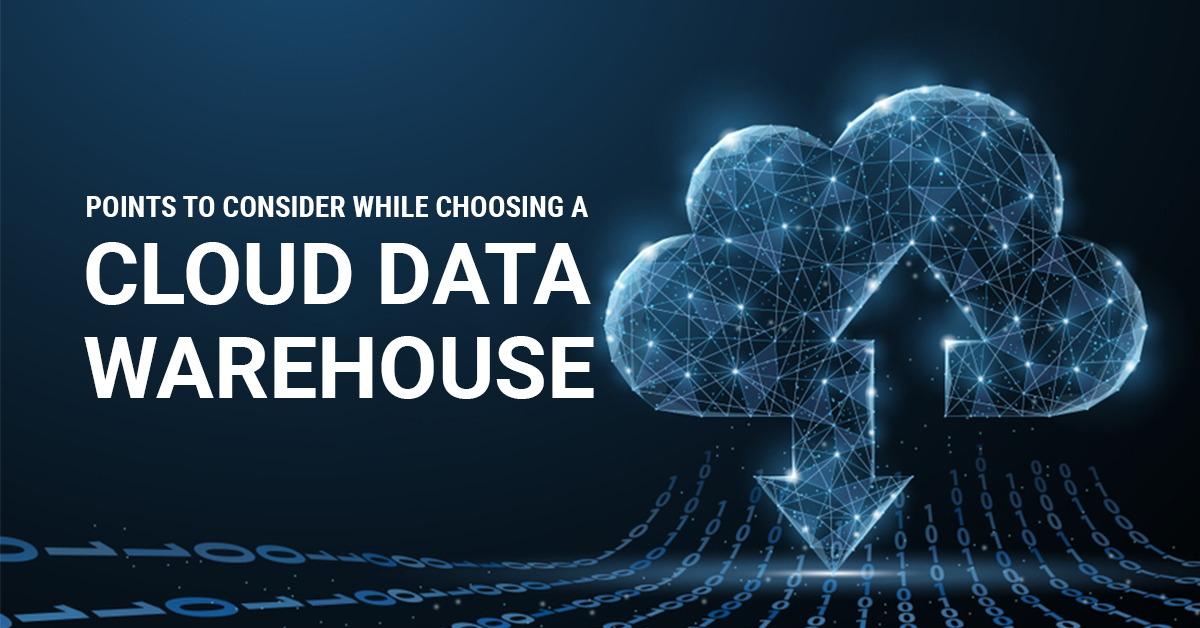Points to consider while choosing a cloud data warehouse

Data Analyst
Experienced data analyst working with data visualization, cloud computing and ETL solutions.
April 07, 2022

A data warehouse (DW) is a type of digital storage that integrates and synergizes vast quantities of data from various sources. Its goal is to fuel business intelligence (BI), reporting, and analytics, as well as fulfill regulatory needs, so that businesses may convert data into insight and make sensible, data-driven choices. Data warehouses operate as a single source of information for a company, keeping both current and historical data in one location.
Data is fed into a data warehouse on a constant schedule via operating systems (such as ERP and CRM), databases, and alternative entities like partner systems, Internet of Things (IoT) devices, weather apps, and social media. The introduction of cloud computing has transformed the scene. Data storage has shifted away from conventional on-premise infrastructure in recent years to a variety of sites, including on-premise, private cloud, and public cloud.
When and why should a data warehouse be considered?
A data warehouse gives you complete control over how you save and analyze your data. It enables you to respond to those difficult analytical queries posed by your panel that aren't suitable to solve with your usual analytics tool.
Google Analytics, for instance, can help you understand what clients are doing on your website or app. Yet, you're restricted to posing questions to be answered using the limited amount of variables, properties, and chart types available.
Clients all across the world are using cloud data warehouses as a platform for business analytics and other data-driven operations. Because of the cloud's basic scalability, using a cloud-based data warehouse saves the expense of supporting internal hardware and infrastructure while also boosting efficiency and financial utilization.
Due to the enormous set of elements that could determine the choice, selecting a service for a cloud data warehouse could be tough. Considering the important components of the most prominent cloud data warehouses, as well as the parameters to apply when analyzing them, is beneficial.
What do cloud data warehouses have in common?
The biggest cloud data warehouse services share several characteristics and essential functions, however technical aspects and price vary.
1. Availability and dependability
Despite their excellent reliability in the past, these data warehouses are not resistant to interruptions or malfunctions. Internet assaults and human mistakes generate delays and make a warehouse inaccessible regularly. Because a data warehouse might be a single point of failure in a company's data-driven operations, it must be reliable. Data replication between data centers and regions is available from most of the main cloud data warehouse companies.
2. Scalability
The flexibility and scalability of storage and computation services are crucial elements of the cloud. The primary cloud data warehousing services are supported by massive parallel processing (MPP) platforms, which enable scaling up when computing demands are high and slimming down to save money when demands are low.
3. Data storage in columnar format
A cloud data warehouse keeps all of its info in columnar form instead of row format. This increases query compression and reduces the number of disc searches.
Factors involved in choosing of data warehouse on the cloud
Despite their commonalities, the big cloud data warehouses have important variances that your company should be aware of before reaching a choice. When deciding which system is suitable for the project, keep the following aspects in mind:
1. Data Types
The initial stage in determining your data warehouse requirements is to figure out what "kind" of data you'll be keeping there. There are two basic "categories" of data in a warehouse: structured and unstructured.
Structured data, or data that perfectly fit into columns and rows, operates well in a relational database. A relational data warehouse would be an excellent match for your firm if your data could be arranged into a single exceptionally big spreadsheet.
With incredibly vast quantities of semi-structured data, a non-relational database shines. Emails, books, social media posts, audio/visual data, and geographical information are all instances of semi-structured data. If you're dealing with totally unstructured data, a data lake is a better option than a traditional data warehouse.
2. Scale
The amount of data you're obtaining and the scale of data your warehouse requires to accommodate are indeed the two factors to consider. All relational cloud-data warehouses can often store large volumes of data with little overhead. You won't require anything more than what they have to provide, particularly if analytics is your main use case.
A non-relational warehouse, on the other hand, will often be a right match in circumstances when extreme size is required (more than 2 terabytes of data), as it will not put limitations on incoming data, enabling you to write quicker. You should also think about how a certain warehouse performs during peak demand.
3. Performance
A further factor to think about is how soon you'll require your data. It all boils down to how quickly your queries can process and how well you can sustain that performance during peak demand. As you might expect, performance and scale are inextricably linked. As you increase the range of your warehouse or manually add more nodes, performance will improve.
Although real-time analytics is necessary for some applications, many analyzes do not necessitate real-time data or fast results. Your data doesn't fluctuate too much minute to minute, therefore you won't be hampered in following larger trends.
4. Maintenance
The smaller your overall workforce, the more likely your engineers will need to concentrate on product development rather than ETL pipelines and day-to-day warehouse management. If your data warehouse isn't self-optimizing, you'll have to hire someone to vacuum, resize, and analyze the cluster to verify it's doing well.
Running a warehouse directly, on the other hand, makes it easy to customize it to your firm's specific demands. You'll have more oversight over quality and profitability if you invest more time carefully configuring and scaling your data warehouse. "More maintenance" equals more control and flexibility to a competent warehouse administrator.
5. Take into account use cases and business requirements.
Although cloud data warehouses are designed to be broadly applicable among sectors and economic divisions, you must think seriously about how you intend to utilize yours, as the criteria for assessing sources can alter depending on the use case and your company's exceptional concerns.
6. Meet all security guidelines.
Your business should choose a cloud data warehouse that offers the amount and grade of security it needs. Even though all of the main security companies maintain their systems up to date and correct flaws, the options and settings differ. Take into account things like key management and access control.
7. Expense
When it comes to choosing between data warehouse methods, the cost is typically a big consideration. However, determining the expense difference between various data warehousing platforms can be difficult. Vendors compute the cost of a certain configuration of processing power, storage, and other factors in remarkably different ways.
So, while you should examine the pricing information on every vendor's website, emphasize asking individuals in your circle how much they spent for comparable setups to the one you'll require.
You would want to seek a system with a reduced compute expense if you're continuously conducting searches on the data. You'll want to hunt for a strategy with cheap storage expenses if you have a bunch of content but only one group using it. One advantage of any cloud-based, relational data warehouse is that storage expenses are often minimal, and the solution does not require a large initial investment to obtain, host, and set up.
8. Time
Time is much more valuable than money, notably for businesses that are trying to steer as swiftly as possible. If one data warehouse charges somewhat less than another but takes five months longer to install, that's five months of your firm not gaining the information it needs to stay ahead of the competition.
9. Community
Finally, consider how simple it will be to arrange your warehouse. If you already have a lot of tools in your company (as some of you may), ensure sure anything you use is compatible with your current technological stack. This would not only make implementation easier, but it would also help your team the time and effort of creating various bespoke ETL pipelines to get your data where it needs to go. (To get data into your warehouse, you might still have to develop a bespoke ETL.)
Conclusion
Picking the finest cloud data warehouse for your company can be difficult because there are so many factors that can influence a system's performance. Considering this, an organization can examine the significant aspects and choose the warehouse that better suits its demands by evaluating predicted use cases and workflows. Even with data warehousing, the most important thing you can do before commencing your review is to establish specific use cases.













